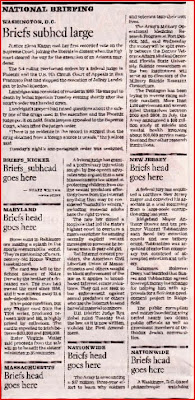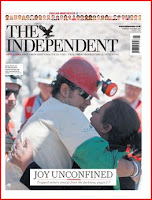
‘Nudist Welfare Man’s Model Wife Fell for the Chinese Hypnotist From the Co-op Bacon Factory’ is my all time favourite
News of the World headline.
It lives up to the paper’s famous advertising slogan : ‘All Human Life is There’ and in popular press parlance is a “Fuck me! Doris” story – as in husband looks up from his paper and exclaims to his wife (Doris) at the other end of the breakfast table about the sensational story he’s reading. A more up to date FMD story in the
News of the World is likely to involve a Premiership footballer snorting coke with a couple of X-Factor contestants and a member of the Royal family, all brought together by a fake Arab sheikh.
But the aim is the same. To astonish and amaze on every page . And the
News of the World is very good at it. Look at some of its scoops this year. Fergie selling access to Andy, the cricket betting fix scandal, Wayne Rooney playing away with prostitutes and boxer Ricky Hatton taking drugs.
When the then
NoW editor Andy Coulson gave a rare interview to
Press Gazette editor Ian Reeves in April 2005 he picked out the key elements of the paper. He named them as revelations; investigations; sport; campaigns; columnists; and politics.
Coulson described sport as: “A central part of the
NoW. We manage to get 24 live pages out with every game covered into our first edition.” So why is there so much pessimism about the Screws coming paywall? Sex and sport is often seen as the driver behind any new technology, including the internet. And sport is definitely the driver behind the success of Sky and satellite television in this country – that’s why football rights cost so much.
Some pundits have suggested that News Corp's desire to buy the whole of BSkyB may create opportunities for bundling multimedia packages for its subscriber base which could mean readers being offered a
NoW and Sky Sports deal. It has also been argued that paywalls aren’t just about monetising the internet but a way of building a database of information about subscribers, including gathering their credit card details. In the case of the
NoW that’s access to the readership of the biggest circulation national Sunday newspaper in the UK.
Would be subscribers to the
NoW site are being offered “a bigger, better video player” and the chance to be “first to see all our agenda- setting exclusives.” Popular journalism is constantly changing. I doubt whether ‘Nudist Welfare Man’s Model Wife Fell for the Chinese Hypnotist From the Co-op Bacon Factory’ or another old
NoW tale: ‘Awful discovery in Drury Lane: child found pickled in jar’ has much online appeal.
But exclusive shots of celebs, Royals and the peccadilloes of Premiership stars may well have potential subscribers reaching for their credit cards. One thing hasn’t changed. The
NoW’s job is to break the big exclusives. If its sex and sport sensations can’t crack the paywall and pull in the punters then what hope is there for popular journalism?
- I am away in Prague this week but the above is a piece on the News of the World's paywall I have written for the new TheMediaBriefing website















































